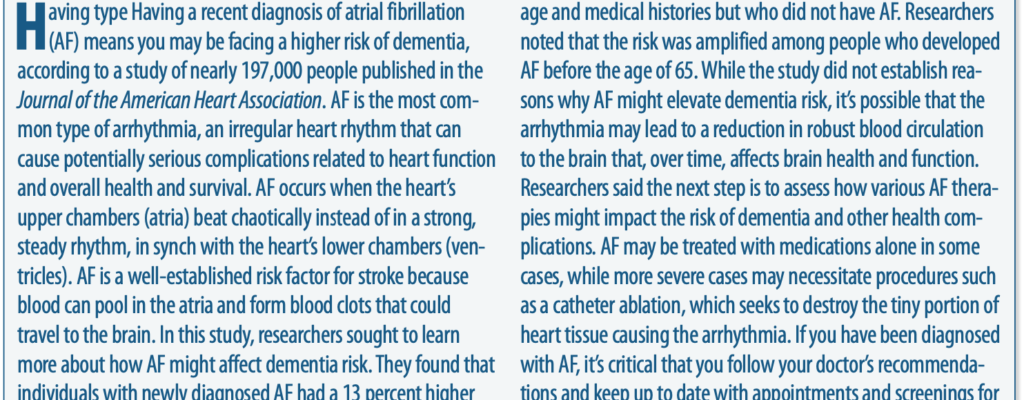Now Eat This: The Diets That May Lower the Risk of Alzheimer’s Disease
Leafy green vegetables, fruits, whole grains, and lean proteins are the well-established staples of a diet that supports optimal cardiovascular health, weight management, energy, and other aspects of physical and emotional well-being. And in a study published earlier this year in Neurology, the medical journal of the American Academy of Neurology, researchers suggest that those foods may also offer some protection against Alzheimer’s disease (AD).
The study found that people who follow a Mediterranean-style eating plan or the MIND  (Mediterranean-DASH Diet Intervention for Neurodegenerative Delay) diet tend to have fewer amyloid plaques and tau tangles—hallmarks of AD—in the brain, compared with individuals who do not adhere to either of those diets. “The study provides exciting new evidence regarding how and why the Mediterranean and MIND diets can support good brain health,” says Massachusetts General Hospital psychiatrist Olivia Okereke, MD. “While prior studies have shown strong associations between these diets and reduced risk of cognitive decline, Alzheimer’s disease and dementia, the current study draws a more direct link between these diets and the changes in the brain that underlie Alzheimer’s disease.”
(Mediterranean-DASH Diet Intervention for Neurodegenerative Delay) diet tend to have fewer amyloid plaques and tau tangles—hallmarks of AD—in the brain, compared with individuals who do not adhere to either of those diets. “The study provides exciting new evidence regarding how and why the Mediterranean and MIND diets can support good brain health,” says Massachusetts General Hospital psychiatrist Olivia Okereke, MD. “While prior studies have shown strong associations between these diets and reduced risk of cognitive decline, Alzheimer’s disease and dementia, the current study draws a more direct link between these diets and the changes in the brain that underlie Alzheimer’s disease.”
She adds that because the investigators found strong connections between Mediterranean and MIND diets and lower burden of Alzheimer’s-type changes in the brain (plaques and tangles), the findings help to make an even stronger case for these diets as particularly brain-healthy—and also point toward a possible explanation.
MIND and Mediterranean
Though very similar, the Mediterranean and the MIND diets differ in a few ways. The Mediterranean diet, for example, recommends daily consumption of vegetables and fruit and at least three servings of fish per week.
The MIND diet prioritizes certain vegetables, such as spinach, kale, and collard greens, as well as berries over other types of fruit. The developers of the MIND diet found that green leafy vegetables and berries are particularly important components for brain health because they are high in antioxidants, molecules that help protect cells from damage and disease, Dr. Okereke says. The MIND diet also recommends at least one serving of fish per week.
Health experts devised the MIND diet to incorporate features of the Mediterranean diet with the Dietary Approaches to Stop Hypertension (DASH) diet, which is similar to the Mediterranean diet but emphasizes characteristics such as reduced sodium intake and the consumption of low-fat and fat-free dairy. To learn more about the elements and benefits of the Mediterranean, MIND, and DASH diets, visit www.hsph.harvard.edu/nutritionsource/healthy-weight/diet-reviews.
Explaining how exactly these diets might affect the development of tau tangles and amyloid plaques—buildups of toxic proteins within and between brain cells—was not part of the study or its findings. “However, the study authors made an important observation that the strong connections between the Mediterranean and MIND diets and lower plaques and tangles in the brain were only partially explained by the potential of these diets to reduce cardiovascular risk,” Dr. Okereke explains. “Even when they accounted for the presence of vascular changes, it was not enough to explain the apparent benefit of the Mediterranean and MIND diets. This is important because it signals that, even though these diets are good for the heart—and that in and of itself is very important—there may be other pathways linking them more specifically to maintaining a healthy brain. For example, these diets can lower inflammation and oxidative stress, and these are mechanisms that have been strongly implicated in the development of Alzheimer’s-type brain pathology.”
Adjusting Your Diet
You may already incorporate many brain-healthy foods into your regular diet. But if you want to move closer to a stricter Mediterranean or MIND eating strategy, you’ll find it’s probably easier than you think.
“The nice thing about these diets is that they are examples of what we call ‘dietary patterns,’” Dr. Okereke says. “Unlike a complicated and ever-changing laundry list of specific foods or so-called ‘superfoods,’ these dietary patterns are easy to follow and they are not simply the latest fad.”
For example, you can find cookbooks with numerous examples of meals that are Mediterranean-style meals, she adds. “You can enjoy variety in your diet, while also getting brain-healthy foods, simply by selecting different recipes and meals that are part of the overall pattern,” Dr. Okereke says. “It’s also easy to increase the MIND-healthy content of any meal by adding in an extra cup of blueberries or dark leafy greens to a salad, for example.”

© YelenaYemchuk| Getty Images
Food for Thought
While a healthy, balanced diet may support long-term brain health, it’s just one of many modifiable lifestyle activities that can contribute to your overall brain health, Dr. Okereke says. “We know that there are other modifiable factors, such as regular physical activity (including simple walking), avoiding smoking, and taking care of our mental health, that also make important contributions to overall risk of Alzheimer’s disease and dementia. Since no one factor accounts for all of the risk in any given person, an excellent approach is to make as many of these lifestyle activity changes as possible.”
The post Now Eat This: The Diets That May Lower the Risk of Alzheimer’s Disease appeared first on University Health News.
Read Original Article: Now Eat This: The Diets That May Lower the Risk of Alzheimer’s Disease »



